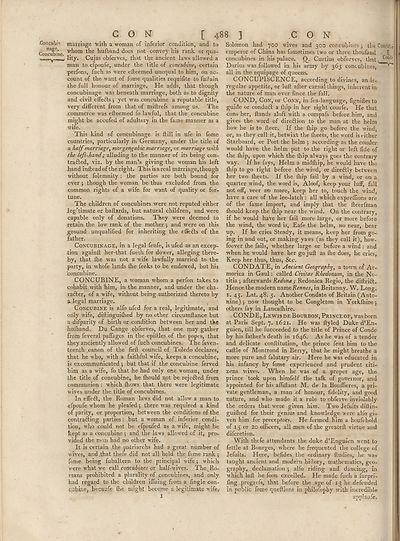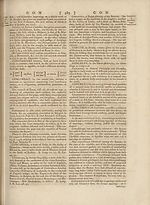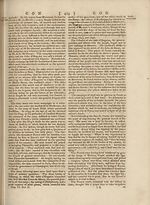Encyclopaedia Britannica, or, a Dictionary of arts, sciences, and miscellaneous literature : enlarged and improved. Illustrated with nearly six hundred engravings > Volume 6, CHI-Crystallization
(518) Page 488
Download files
Complete book:
Individual page:
Thumbnail gallery: Grid view | List view

CON [ 488 ] .CO N
Goiivubi’ marriage with a woman of inferior condition, and to
Concubine 'v^om t^ie hufband does not convey his rank or qua-
t i- ‘ lily. Cujas obferves, that the ancient laws allowed a
man to efpoufe, under the title of concubinei certain
perfons, fuch as were efteemed unequal to him, on ac¬
count of the want of fome qualities requifite to fuflain
the full honour of marriage. He adds, that though
concubinage was beneath marriage, both as to dignity
and civil effe&s; yet was concubine a reputable title,
very different from that of miflrefs among us. The
commerce was efteemed fo lawful, that the concubine
might be accufed of adultery in the fame manner as a
wife.
This kind of concubinage is ftill in ufe in fome
countries, particularly in Germany, under the title of
a half marriage, morgetigabic marriage, or marriage with
the left-hand; alluding to the manner of its being con-
trafted, viz. by the man’s giving the woman his left
hand inftead of the right. This is a real marriage, though
without folemnity : the parties are both bound for
ever j though the woman be thus excluded from the
common rights of a wife for want of quality or for¬
tune.
The children of concubines were not reputed either
leg'timate or baftards, but natural children, and were
capable only of donations. They were deemed to
retain the low rank of the mother 5 and -were on this
ground unqualified for inheriting the effects of the
father.
Concubinage, in a legal fenfe, is ufed as an excep¬
tion againft her-that fueth for dower, alleging there¬
by, that Ihe was not a wife lawfully married to the
party, in whofe lands Ihe feeks to be endowed, but his
concubine.
CONCUBINE, a wroman whom a perfon takes to
cohabit with him, in -the manner, and under the cha-
ra&er, of a wife, without being authorized thereto by
a legal marriage.
Concubine is alfo ufed for a real, legitimate, and
only wife, diftinguiftied by no other circumftance but
a difparity of birth or condition between her and the
hulband. Du Cange obferves, that one may gather
from feveral paffages in the epifiles of the popes, that
they anciently allowed of fuch concubines. The feven-
teenth canon of the firfl council of Toledo declares,
that he who, with a faithful wife, keeps a concubine,
is excommunicated ; but that if the concubine ferved
him as a wife, fo that he had only one woman, under
the title of concubine, he ftiould not be reje&ed from
communion : which ftiows that there were legitimate
wives under the title of concubines.
In effedl, the Roman laws did not allow a man to
efpoufe whom he pleafed *, there ivas required a kind
of parity, or proportion, between the conditions of the
contradling parties : but a woman of inferior condi¬
tion, who could not be efpoufed as a wife, might be
kept as a concubine •, and the laws allowed of it, pro¬
vided the man had no other wife.
It is certain the patriarchs had a great number of
w ives, and That thefe did not all hold the fame rank ;
fome being fubaltern to the principal wife; which
were what we call concubines or half-wives. The Ro¬
mans prohibited a plurality of concubines, and only
had regard to the children ifiuing from a fingle con¬
cubine, becaufe fire might become a legitimate wife.
1
Solomon had 'yoo wives and 300 concubines; the Coneutir
emperor of China has fometimes two or three thoufand II
concubines in his palace. Curtius obferves, that
Darius was followed in his army by 365 concubines, ^
all in the equipage of queens.
CONCUPISCENCE, according to divines, an ir¬
regular appetite, or lull after carnal things, inherent in
the nature of man ever fince the fall.
COND, Con, or Conn, in fea-language, fignifies to
guide or condud a fliip in her right courfe. He that
cons her, ftands aloft with a compafs before him, and
gives the word of direction to the man at the helm
how he is to fteer. If the ftiip go before the wind,
or, as they call it, betwixt the (beets, the word is either
Starboard, or Port the helm ; according as the conder
would have the helm put to the right or left fide of
the ftiip, upon which the (hip always goes the contrary
way. If he fays, Helm a midftiip, he would have the
(hip to go right before the wind, or diredly between
her two (beets. If the (hip fail by a wind, or on a
quarter wind, the wmrd is, Aloof, keep your luff, fall
not off, veer no more, keep her to, touch the wind,
have a care of the lee-latch : all which expreftions are
of the fame import, and imply that the fteerfman
(hould keep the (hip near the Avind. On the contrary,
if he would have her fail more large, or more before
the wind, the wrord is, Eafe the helm, no near, bear
up. If he cries Steady, it means, keep her from go¬
ing in and out, or making yaws (as they call it), how-
foever (he fails, whether large or before a wind : and
when he w ould have her go juft as (he does, he cries,
Keep her thus, thus, &c.
COND ATE, in Ancient Geography, a town of Ar¬
morica in Gaul: called Civitas Rhedonum, in the No-
titia ; afterwards Redona ; Redonica Regio, the diftrift.
Hence the modern mme Rennes, in Britanny. W. Long.
1. 45. Lat. 48. 5. Another Condate of Britain (Anto-
nine) •, now thought to be Congleton in Yorkftiire j
others fay in Lancaftiire.
CONDE, Lewis de Bourbon, Prince of, was born
at Paris Sept. 7. 1621. He was ftyled Duke d’En-
guien, till he fucceeded to the title of Prince of Conde
by his father’s death in 1646. As he was of a tender
and delicate conftitution, the prince fent him to the
caftle of Montrond in Berry, that he might breathe a
more pure and falutary air. Here he was educated in
his infancy by fome experienced and prudent citi¬
zens wives. When he was of a proper age, the
prince took upon himfelf the talk of governor, and
appointed for his afliftant M. de la Bouflieres, a pri¬
vate gentleman, a man of honour, fidelity, and good
nature, and who made it a rule to obferve inviolably
the orders that w'ere given him. Two Jefuits difiin-
guiftied for their genius and knowledge were alfo gi¬
ven him for preceptors. He formed him a houfehold
of 15 or 20 officers, all men of the greateft virtue and
diferetion.
With thefe attendants the duke d’Enguien went to
fettle at Bourges, where he frequented the college of
Jefuits. Here, befides the ordinary ftudies, he was
taught ancient and modern hiftory, mathematics, geo¬
graphy, declamation *, alfo riding and dancing, in
which laft he foon excelled. He made fuch a furpri-
fing progrefs., that before the age of 13 he defended
in public fome queftions in philofopby with incredible
applaufe.
Goiivubi’ marriage with a woman of inferior condition, and to
Concubine 'v^om t^ie hufband does not convey his rank or qua-
t i- ‘ lily. Cujas obferves, that the ancient laws allowed a
man to efpoufe, under the title of concubinei certain
perfons, fuch as were efteemed unequal to him, on ac¬
count of the want of fome qualities requifite to fuflain
the full honour of marriage. He adds, that though
concubinage was beneath marriage, both as to dignity
and civil effe&s; yet was concubine a reputable title,
very different from that of miflrefs among us. The
commerce was efteemed fo lawful, that the concubine
might be accufed of adultery in the fame manner as a
wife.
This kind of concubinage is ftill in ufe in fome
countries, particularly in Germany, under the title of
a half marriage, morgetigabic marriage, or marriage with
the left-hand; alluding to the manner of its being con-
trafted, viz. by the man’s giving the woman his left
hand inftead of the right. This is a real marriage, though
without folemnity : the parties are both bound for
ever j though the woman be thus excluded from the
common rights of a wife for want of quality or for¬
tune.
The children of concubines were not reputed either
leg'timate or baftards, but natural children, and were
capable only of donations. They were deemed to
retain the low rank of the mother 5 and -were on this
ground unqualified for inheriting the effects of the
father.
Concubinage, in a legal fenfe, is ufed as an excep¬
tion againft her-that fueth for dower, alleging there¬
by, that Ihe was not a wife lawfully married to the
party, in whofe lands Ihe feeks to be endowed, but his
concubine.
CONCUBINE, a wroman whom a perfon takes to
cohabit with him, in -the manner, and under the cha-
ra&er, of a wife, without being authorized thereto by
a legal marriage.
Concubine is alfo ufed for a real, legitimate, and
only wife, diftinguiftied by no other circumftance but
a difparity of birth or condition between her and the
hulband. Du Cange obferves, that one may gather
from feveral paffages in the epifiles of the popes, that
they anciently allowed of fuch concubines. The feven-
teenth canon of the firfl council of Toledo declares,
that he who, with a faithful wife, keeps a concubine,
is excommunicated ; but that if the concubine ferved
him as a wife, fo that he had only one woman, under
the title of concubine, he ftiould not be reje&ed from
communion : which ftiows that there were legitimate
wives under the title of concubines.
In effedl, the Roman laws did not allow a man to
efpoufe whom he pleafed *, there ivas required a kind
of parity, or proportion, between the conditions of the
contradling parties : but a woman of inferior condi¬
tion, who could not be efpoufed as a wife, might be
kept as a concubine •, and the laws allowed of it, pro¬
vided the man had no other wife.
It is certain the patriarchs had a great number of
w ives, and That thefe did not all hold the fame rank ;
fome being fubaltern to the principal wife; which
were what we call concubines or half-wives. The Ro¬
mans prohibited a plurality of concubines, and only
had regard to the children ifiuing from a fingle con¬
cubine, becaufe fire might become a legitimate wife.
1
Solomon had 'yoo wives and 300 concubines; the Coneutir
emperor of China has fometimes two or three thoufand II
concubines in his palace. Curtius obferves, that
Darius was followed in his army by 365 concubines, ^
all in the equipage of queens.
CONCUPISCENCE, according to divines, an ir¬
regular appetite, or lull after carnal things, inherent in
the nature of man ever fince the fall.
COND, Con, or Conn, in fea-language, fignifies to
guide or condud a fliip in her right courfe. He that
cons her, ftands aloft with a compafs before him, and
gives the word of direction to the man at the helm
how he is to fteer. If the ftiip go before the wind,
or, as they call it, betwixt the (beets, the word is either
Starboard, or Port the helm ; according as the conder
would have the helm put to the right or left fide of
the ftiip, upon which the (hip always goes the contrary
way. If he fays, Helm a midftiip, he would have the
(hip to go right before the wind, or diredly between
her two (beets. If the (hip fail by a wind, or on a
quarter wind, the wmrd is, Aloof, keep your luff, fall
not off, veer no more, keep her to, touch the wind,
have a care of the lee-latch : all which expreftions are
of the fame import, and imply that the fteerfman
(hould keep the (hip near the Avind. On the contrary,
if he would have her fail more large, or more before
the wind, the wrord is, Eafe the helm, no near, bear
up. If he cries Steady, it means, keep her from go¬
ing in and out, or making yaws (as they call it), how-
foever (he fails, whether large or before a wind : and
when he w ould have her go juft as (he does, he cries,
Keep her thus, thus, &c.
COND ATE, in Ancient Geography, a town of Ar¬
morica in Gaul: called Civitas Rhedonum, in the No-
titia ; afterwards Redona ; Redonica Regio, the diftrift.
Hence the modern mme Rennes, in Britanny. W. Long.
1. 45. Lat. 48. 5. Another Condate of Britain (Anto-
nine) •, now thought to be Congleton in Yorkftiire j
others fay in Lancaftiire.
CONDE, Lewis de Bourbon, Prince of, was born
at Paris Sept. 7. 1621. He was ftyled Duke d’En-
guien, till he fucceeded to the title of Prince of Conde
by his father’s death in 1646. As he was of a tender
and delicate conftitution, the prince fent him to the
caftle of Montrond in Berry, that he might breathe a
more pure and falutary air. Here he was educated in
his infancy by fome experienced and prudent citi¬
zens wives. When he was of a proper age, the
prince took upon himfelf the talk of governor, and
appointed for his afliftant M. de la Bouflieres, a pri¬
vate gentleman, a man of honour, fidelity, and good
nature, and who made it a rule to obferve inviolably
the orders that w'ere given him. Two Jefuits difiin-
guiftied for their genius and knowledge were alfo gi¬
ven him for preceptors. He formed him a houfehold
of 15 or 20 officers, all men of the greateft virtue and
diferetion.
With thefe attendants the duke d’Enguien went to
fettle at Bourges, where he frequented the college of
Jefuits. Here, befides the ordinary ftudies, he was
taught ancient and modern hiftory, mathematics, geo¬
graphy, declamation *, alfo riding and dancing, in
which laft he foon excelled. He made fuch a furpri-
fing progrefs., that before the age of 13 he defended
in public fome queftions in philofopby with incredible
applaufe.
Set display mode to:
![]() Universal Viewer |
Universal Viewer | ![]() Mirador |
Large image | Transcription
Mirador |
Large image | Transcription
Images and transcriptions on this page, including medium image downloads, may be used under the Creative Commons Attribution 4.0 International Licence unless otherwise stated. ![]()
| Permanent URL | https://digital.nls.uk/193014157 |
|---|
| Attribution and copyright: |
|
|---|
| Description | Ten editions of 'Encyclopaedia Britannica', issued from 1768-1903, in 231 volumes. Originally issued in 100 weekly parts (3 volumes) between 1768 and 1771 by publishers: Colin Macfarquhar and Andrew Bell (Edinburgh); editor: William Smellie: engraver: Andrew Bell. Expanded editions in the 19th century featured more volumes and contributions from leading experts in their fields. Managed and published in Edinburgh up to the 9th edition (25 volumes, from 1875-1889); the 10th edition (1902-1903) re-issued the 9th edition, with 11 supplementary volumes. |
|---|---|
| Additional NLS resources: |
|

